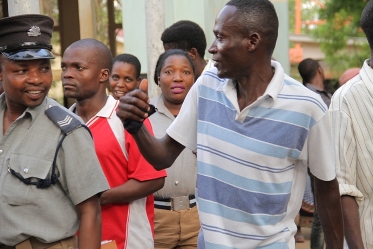
BLANTYRE, Malawi – The revelation by a 45-year-old man from the southern Africa nation of Malawi that despite being HIV positive, he had sex with 104 women including virgins has triggered debate on how to an end archaic traditions in Africa. Without any iota of shame or remorse, the man Eric Aniva boasted how he had sex with bereaved widows and virgins in the cultural practice conducted to exorcise evil spirits.
According to the revelation on BBC World Service on July 21 Aniva had been providing sexual ‘cleansing’ services, which entailed having sex with a widow whose husbands were dead. The sexual encounters took place before burial of the deceased husband and were meant to exorcise evil spirits that may bring strange misfortunes and death to the bereaved family.
Another shocking custom he practised involved having sex with teenage girls after their first menstruation. Locally known as “kusasa fumbi,” the custom is aimed at preparing girls for married life once they reach puberty. Tradition has it that once having sex with a hired man or a hyena, is a proof that the girls have graduated from childhood to adulthood. If the girls refuse to have sex with a hired man, the primitive belief is that a disease or fatal misfortune may befall their families.
In Malawi, the primeval tradition is in the limelight after BBC exposed with one practitioners boasting about it. “Some girls are just 12 or 13 years old, but I prefer them older. All these girls find pleasure in having me as their hyena. They actually are proud and tell other people that this man is a real man, he knows how to please a woman,” boasted Aniva in a BBC interview.
While Aniva is now serving a two-year jail sentence after a magistrate court in Malawi found him guilty of practicing archaic customs that violate women rights, harmful traditions continue to be practised in many African countries. The majority of the victims of such traditions which are fuelled by patriarchal systems are illiterate and poor girls and women.
One tradition which many African nations are fighting due to its severe and negative impact on the well-being of girls is female genital mutilation (FGM).
According to the World Health Organization, FGM is a procedure involving partial or total removal of the external female genitalia or other injury to the female genital organs for non-medical reasons. It is estimated that over 100 million girls and women have undergone genital cutting.
There are several reasons FGM is practised. Some say it marks an important rite of passage into womanhood while others believe it guarantees virginity, curbs female sexual desires, prevent promiscuity, maintain hygiene and increase fertility. Despite having consequences such as obstetric fistula, menstrual problems, painful sexual intercourse, HIV/AIDS, infertility and psychological trauma, others still defend FGM. Paradoxically, in some societies some defenders of FGM are women themselves.
Apart from FGM and sexual cleansing, other strange customs are still rampant in Africa. For instance, in some parts of Sudan, amongst the Latuka tribe, when a man wants to marry kidnaps a prospective wife. Elderly members of his family go and ask the girl’s father for her hand in marriage. If father agrees, he beats the suitor as a sign of his acceptance of the union. The funny part is that even if the daughter’s father disapproves the marriage, the kidnapper may still forcefully marry the girl.
While in southern Africa, the ancient practice of paying dowry (lobola) whereby families put a price on the bride continues to flourish, for many years, the western African nation of Ghana has been battling an Ewe tribal custom. It holds that for serious offenses like murder, rape and theft, the spirits can only be appeased by the enslavement of young virgins from the offender’s family in the shrines of traditional priests. While such a custom is illegal, the bondage of such girls, including their sexual enslavement to the priests, has been in practice for centuries.
The challenge facing many countries in Africa is how to root out primitive traditions which even laws instituted by African states are failing to bring to an end. The imprisonment of traditionalists such as HIV-positive Aniva in Malawi for sleeping with 104 girls has generated a fierce debate on the effectiveness of such a strategy in ending traditions formed over many generations.
Jose Safarao, a renowned columnist for a local newspaper in Malawi Jose Safarao, once argued that the prosecution and imprisonment of traditionalists like Aniva is wrong and unjustified as such personalities are just victims of cultural circumstances.
“Arresting Aniva is like treating the symptoms rather than the disease. Aniva did not go looking for widows and adolescents to sleep with. They hired him; ‘they’ meaning custodians of culture in his community. They even paid him to do it. Arresting Aniva will not stop the sexual cleansing culture,” he argued. According to Safarao, such arrests just forces custodians of the culture to secretly hire ‘hyenas’ and make them vow never to talk to the media.
“The crux of the matter is how to deal with the culture,” he observed.
But activists do not agree with such thinking. Women activists believe that in the combo of fighting harmful cultural practices, stiff punishments for practitioners of archaic customs should be part of the strategy.
The long and short of it is that elimination of harmful traditions requires an approach that integrates economic empowerment of women with access to good reproductive health services, education and behavioural change at community level. Legislation alone cannot end the problem.
